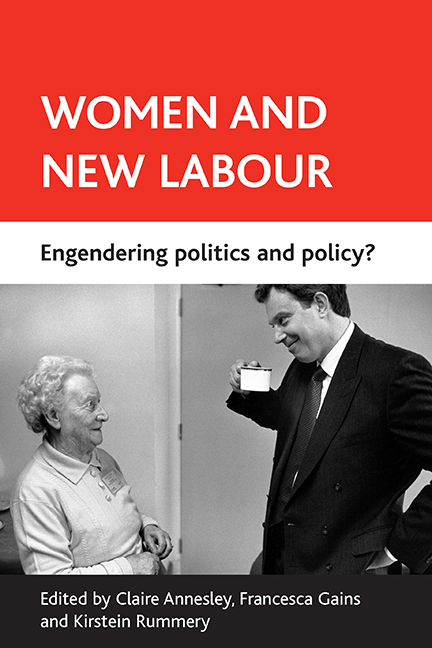Foreword
Published online by Cambridge University Press: 15 September 2022
Summary
Women and New Labour: Engendering Politics and Policy? is the product of a collective inter-disciplinary research project conducted by the Social Science Gender Research Network at the University of Manchester. In September 2005 we were invited to act as discussants for one of the project workshops and we were pleased to be asked to write this foreword. In exploring various policy outcomes Women and New Labour facilitates gender and politics scholars in the analysis of key themes of the sub-discipline, particularly the relationship between the descriptive and substantive representation of women and the interaction between actors and institutions (increasingly becoming known as feminist institutionalism). Its focus on policies that have been relatively neglected by feminist scholars, such as economic policy, alongside analyses of welfare, care and sexuality and its acknowledgement of differences between women, is a strength of this book. Moreover, Women and New Labour constitutes a much-needed initial contribution to the task of gendering the mainstream literature on policy-making and governance in British politics.
Our aim in this foreword is to position the collection within the wider contemporary debates in the gender and politics literature. The issues raised here could be taken further in future research and analysis in the UK and elsewhere, and contribute to the development of a comparative politics of gender. On reading Women and New Labour, four key questions that have more general applicability stand out: (1) How is a particular political formation or government gendered, in terms of both its ideology and practice? (2) How is the policy-making process gendered? (3) What is the impact of the wider political opportunity structure, and (4) What are the gender outcomes?
How is New Labour gendered?
As this volume details, the incoming New Labour government in 1997 was, in terms of sex, the most descriptively representative ever. Party change in the 1980s and 1990s established internal party sex quotas that ensured a rough parity of representation at all levels of the party; all women shortlists guaranteed a better representation of women in the Parliamentary Labour Party in 1997. There were also record numbers of women in the Cabinet and government alongside the establishment of new forms of gender machinery – a Women's Minister and a Women's Unit – and the adoption of gender mainstreaming.
- Type
- Chapter
- Information
- Women and New LabourEngendering Politics and Policy?, pp. ix - xiPublisher: Bristol University PressPrint publication year: 2007



